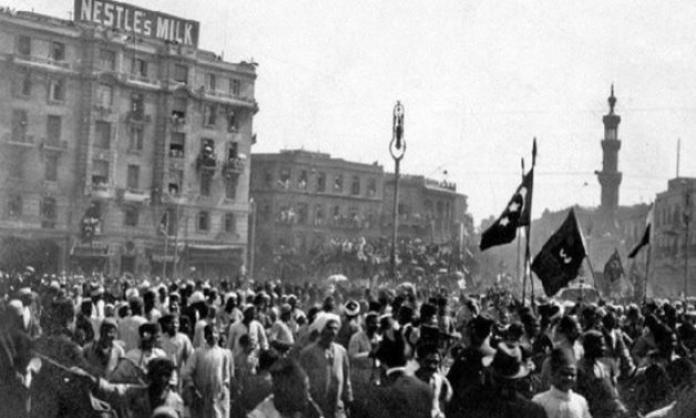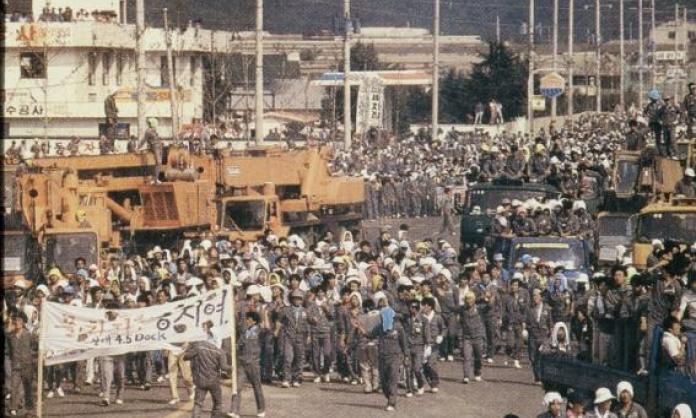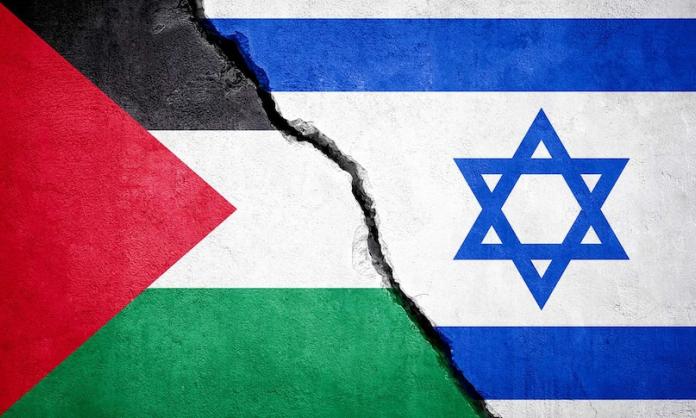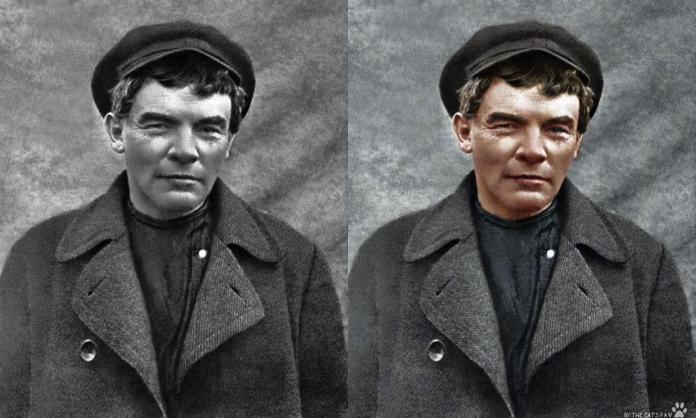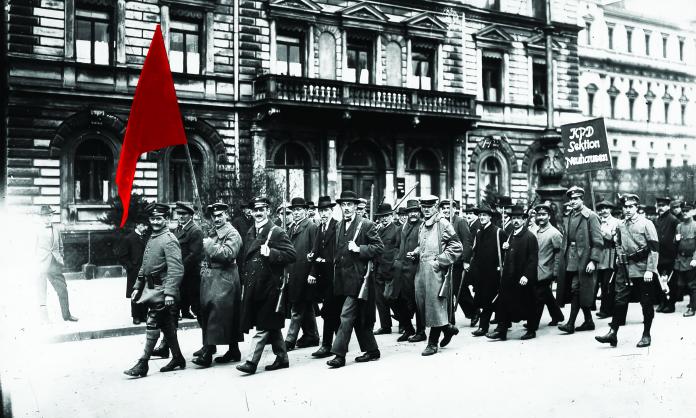“He who controls the past controls the future.” So says Winston Smith in George Orwell’s Nineteen Eighty-Four. Makes me think of the gaggle of reputable historians who roll out fictional accounts of the Russian Revolution of 1917. Bolshevism? Workers’ power? Don’t even think of it; listen instead to our fanciful telling of events.
In October 1917 the workers’, soldiers’ and peasants’ soviets (workers councils) overthrew the unelected, pro-capitalist provisional government formed after the February Revolution because it would not end the war, grant reforms to workers or give the land to the peasants.
Invariably our fiction writers masquerading as historians encourage us to view this insurrection only through the lens of the three years of civil war that followed and the eventual counter-revolution overseen by Stalin, formerly a Bolshevik leader. Many argue that if only the Bolsheviks had formed a coalition government with all the other socialist parties, there would have been liberal democracy instead of civil war.
Bit of an oversight not to notice the well-documented fact that the Railway Workers’ Union’s spirited attempt to facilitate a coalition of all the socialists did not founder on the rock of Bolshevik intransigence. Too confronting to admit that the Mensheviks and Socialist Revolutionaries (SRs), who preferred capitalist exploitation to the possibility of socialism, refused to participate in any government that included Lenin or Trotsky, the two most significant leaders of the rebellion.
The Mensheviks walked out of the Congress of the Soviets of Workers, Soldiers and Peasants on the night of 25 October. Sukhanov, on the left wing of the Mensheviks, referred to this in his memoirs, published for all to read, as “criminal … dishonest and frivolous”, “discrediting and debasing ourselves in the eyes of the masses, and ruining the entire future of our organization and our principles”.
He wasn’t to know that historians by and large would choose to stand with Sukhanov’s discredited organisation, many members of which joined in the bloody counter-revolution, as he predicted.
The leader who led the SRs out of the congress stated that “there are moments when it is necessary to decide an agreement with weapons” just as army officers attempted a coup. Trotsky wrote angrily of the moderates: “These socialists and democrats, having made a compromise by hook and crook with the imperialist bourgeoisie, today flatly refuse to compromise with the people in revolt”. The Railway Union, disgusted, condemned them.
The Bolsheviks did form a coalition government with the Left SRs, a split from the SRs and the only other party that supported soviet power.
Our “historians” see the dispersal of the Constituent Assembly in January 1918 as the tipping point, setting Lenin and the Bolsheviks on an irrevocable course to dictatorial rule and civil war. At the time, this assembly was a farce; its demise passed without notice after a weary figure approached the chair to say the guards were too tired so they were closing it down.
But more to the point, the White terror against the revolution had begun five weeks earlier. On 29 October dozens of workers who surrendered with promises of no reprisals had been massacred in Moscow by reactionary troops. Victor Serge, the libertarian who chronicled the fate of the revolution, recorded an account: “in a few minutes … a heap of men [were] lying there screaming and bleeding, into which the bullets still ram … The walls of the surrounding buildings are spattered with blood and bits of flesh”.
Everywhere in Moscow before the soviet took power, White army forces were arresting and executing workers. Serge writes:
“Let us remember these facts. They show the firm intention of the defenders of the Provisional Government to drown the workers’ revolution in blood. The White terror had begun.”
The civil war that followed was not the result of Bolshevik intransigence or sectarianism, but of the logical march of events, which had begun as early as 21 April, when workers and soldiers flooded Petrograd’s streets protesting a treacherous proclamation by Miliukov, the Provisional Government’s foreign minister, telling the world that Russia was now more determined to conduct the war. They were met by the first open and broad mobilisation of counter-revolutionaries. Trucks with armed officers and students rolled into the city centre. The first blood was shed since the February uprising. Trotsky writes:
“Two worlds stood face to face. The patriotic columns called into the streets against the workers and soldiers by the [liberal capitalists’] Cadet Party consisted exclusively of … officers, officials, intelligentsia. Two human floods … had issued from different parts of the town. Different in social composition, not a bit similar in external appearance, and with hostile inscriptions on their placards.”
On one side, “Down with the war!”, “Down with Miliukov!” On the other, “Full Confidence to the Provisional Government!”, “Long Live Miliukov!”
General Kornilov moved cannon into the Palace Square, a sign of things to come. In August he, with the connivance of Kerensky, the head of the Provisional Government, would attempt to stage a military coup, defeated only by the mobilisation of workers’ factory committees led by the Bolsheviks.
Even before the fall of the tsar, the representatives of the old ruling classes were already preparing for the total destruction of workers’ democracy. They did not flinch from the alternative of military dictatorship. On the morning of 27 February, the left-leaning Cadet, Nekrasov, proposed “to establish a military dictatorship, handing over the whole power to a popular general”.
John Reed, in his famous Ten Days that Shook the World, testified to the absolute absence of democratic principles driving the capitalist class. In the words of the “Russian Rockefeller”, a prominent Cadet:
“The government can evacuate Petrograd, then a state of siege declared, and the military commander of the district can deal with [the Bolsheviki] without legal formalities … Or if, for example, the Constituent Assembly manifests any Utopian tendencies, it can be dispersed by force of arms.”
An industrialist outlines in his memoirs how he and other reactionaries began in June to deal with the situation:
“A private committee, consisting of banks and insurance companies, was organised at the initiative of A.I. Putilov [owner of the giant Putilov steel works] … In order to give an official justification for our existence, we called ourselves the Society for the Economic Rehabilitation of Russia. Actually … [i]n the end, we decided to place the large funds that we collected at the disposal of General Kornilov for the purposes of organising an armed struggle against the Soviets.”
Increasingly the capitalists came to support a military assault on Petrograd to end the power of the soviets once and for all. Even the “most progressive” capitalists who welcomed the overthrow of the tsar “made confrontation their declared aim”, according to a historian who studied them.
They were ever more openly admitting that they preferred a German takeover to establish “law and order” over soviet control. Rodzianko, a former chairman of the tsarist parliament, wrote: “With the taking of Petrograd, the Baltic fleet will also be destroyed … But there will be nothing to regret”.
The capitalists had expected to rule once the tsar fell, but now they faced being displaced by a revolutionary government with the backing of the vast majority of the Russian Empire.
So by Kornilov’s attempted coup, there is no mistaking the intentions of the Provisional Government and its supporters – and it wasn’t democracy, or a compromise with the Bolsheviks. Kornilov trusted General Aleksandr Krymov with his plans for the death of the popular revolution because “I am convinced that he will not hesitate, if need arises, to hang the whole membership of the Soviet of Workers’ and Soldiers’ Deputies” – in which the Bolsheviks did not yet command a majority.
There could be no middle way; they openly said it would be “Lenin or Kornilov”, a realistic view of the different forces involved.
The capitalists, tied to international capital by loans and social ties, had to prosecute the imperialist war to maintain any credibility in the eyes of their allies. And the empire was the source of much of the profits they felt entitled to.
They were committed to the landlords through both economic and family ties. But the peasantry, raised to revolutionary struggle, would be satisfied with nothing short of confiscation of the land – and that threatened the financial system with collapse. The banks rested on loans secured by land. So the Provisional Government was under incredible pressure from the landlords for military action against the peasant revolts.
The Russian bourgeoisie had not, over the few decades of late industrial development, built a social base as the European capitalists had done over centuries before the French Revolution.
As Marxist historian Mike Haynes concludes: “The very possibility of the leading bourgeois democratic party surviving depended on its ability to limit democracy for fear that it would be swept away”. And William Rosenburg, a historian of the liberal capitalists, argued: “With their limited national constituency, the Cadets themselves could never claim to rule on the basis of representative principles”.
Tyrkova, a leader of the Cadets, summed up their general view: they “must support the dictator over Kerensky, there is no other way, only through blood”.
This explains the absolute collapse of support for the Provisional Government and the moderate socialists in it. Blindly committed to capitalist rule, the moderates’ overwhelming majority in the soviets in March evaporated by October. The Mensheviks’ representation in the soviet congress had plummeted from 200 in June to 70. The Bolsheviks had 390 with another 190 pro-Bolshevik Left SRs out of 650 delegates.
In their rage at being sidelined by what they regarded as rabble, the moderates turned on the Bolsheviks with venom. Plekhanov, venerated as the founder of Russian Marxism but now a supporter of World War I, referred to them as a “revolting mixture of utopian idealists, imbeciles, traitors …”. A week before the insurrection, he declared “[We] must not only master but crush this vermin, drown it in blood”.
There was never going to be a liberal capitalist regime in Russia. Lenin and Trotsky had argued that the capitalists were too cowardly to overthrow the tsar; this task would fall to workers backed up by the peasantry. This inevitably turned it into a socialist revolution.
But they always knew they could not build socialism in backward Russia. If the workers of the West do not overthrow the capitalists and bring us material aid, they argued, we will be crushed. But that defeat happened in an unpredictable way, confusing the left and providing a convenient lie for the right.
Tragically, Communist parties supported Stalin as the supposed inheritor of Lenin, the first big lie of the century. The West simply held up a mirror to declare: revolution will bring you repressive bureaucratic dictatorship.
The Whites, with the backing of the supposedly cultured, enlightened, liberal West, were infamous for anti-Jewish pogroms, massacres and handing back the land to the hated landlords. Their alternative to Bolshevism was fascism.
Revolutions across Europe were defeated, leaving the Russian workers and peasants isolated in the midst of the ruins of imperialist war, sabotage, civil war, invasions and blockades. The ultimate destruction of the revolution was not the consequence of extremism, revolutionary leadership or workers’ power. In fact, the responsibility for the ensuing counter-revolution by Stalin rests heavily on the shoulders of the socialist leaders of the West who squashed or squandered the popular uprisings.
Only revolutionary parties which led Europe’s workers to power could have saved the Russian revolution. But no historian committed to capitalist rule is going to explain that or admit the alternative. Their fiction is ideologically driven, because, they sense, like Orwell’s Winston, “he who controls the past …”






